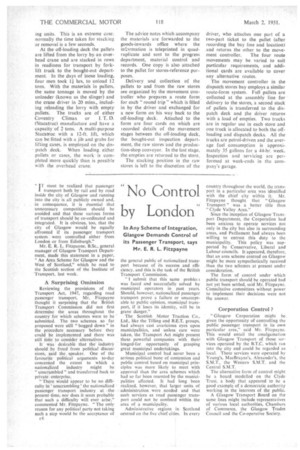"No Control by London"
Page 44

If you've noticed an error in this article please click here to report it so we can fix it.
In Any Scheme of Integration, Glasgow Demands Control of its Passenger Transport, says Mr. E. R. L. Fitzpayne " 11must be realized that passenger I transport both by rail and by road inside the city of Glasgow and running into the city is all publicly owned and, in consequence, it is essential that unnecessary competition should be avoided and that these various forms of transport should be co-ordinated and integrated. It is obvious, too, that the city of Glasgow would be equally affronted if its passenger transport system were controlled either from London or from Edinburgh."
Mr. E. R. L. Fitzpayne, B.Sc., general manager of Glasgow Transport Department, made this statement in a paper, "An Area Scheme for Glasgow and the West of Scotland," which he read to the Scottish section of the Institute of Transport. last week.
A Surprising Omission Reviewing the provisions of the Transport Act. 1947, regarding road passenger transport, Mr. Fitzpayne thought it surprising that the British Transport Commission did not first determine the areas throughout the country for which schemes were to be submitted. The two schemes so far proposed were still "bogged down" in the procedure necessary before they could be implemented and there was still time to consider alternatives.
It was desirable that the industry should be freed from political discussions, said the speaker. One of the favourite political arguments to-day concerned the extent to which a nationalized industry might be " unscrambled " and transferred back to private enterprise.
"There would appear to be no difficulty in 'unscrambling' the nationalized passenger transport industry at the present time, nor does it seem probable that such a difficulty will ever arise," commented Mr. Fitzpayne. "The only reason for any political party not taking such a step would be the acceptance of c6 the general public of nationalized transport because of its success and efficiency, and this is the task of the British Transport Commission.
"I submit that this same probletA was faced and successfully solved by municipal operators in past years. Should, however, nationalized passenger transport prove a failure or unacceptable to public opinion, municipal transport, if it loses its identity, will be in grave danger."
The Scottish Motor Traction Co., Ltd., like the Tilling and B.E.T. groups, had always cast avaricious eyes upon municipalities, and unless care were taken, the Transport Act might present these powerful companies with their longed-for opportunity of grasping great municipal undertakings.
Municipal control had never been a serious political bone of contention and public control based on municipal principles was more likely to meet with approval than the area schemes which had so far been resented by the municipalities affected. It had long been realized, however, that larger units of administration were needed and that such services as road passenger transport could not be confined within the area of a municipality.
Administrative regions in Scotland centred on the five chief cities. In every
country throughout the world, the transport in a particular area was identified with the chief city within it. Mr. Fitzpayne thought that " Glasgow Transport" was a better title than "Clyde Valley Area."
Since the inception of Glasgow Transport Department, the Corporation had been anxious to operate services not only in the city but also in surrounding areas, and Parliament had always been willing to entrust this duty to the municipality. This policy was supported by Conservative, Liberal and Labour councils. It appeared, therefore. that an area scheme centred on Glasgow might be more sympathetically received than the two schemes at present under consideration.
The form of control under which public transport should be operated had not yet been settled. said Mr. Fitzpayne. Consultative committees without power to implement their decisions were not the answer.
Corporation Control ?
"Glasgow Corporation might be given the opportunity of controlling the public passenger transport in its own particular area," said Mr. Fitzpayne. This would entail the amalgamation with Glasgow Transport of those services operated by the B.T.C. which ran into the city and could be regarded as local. These services were operated by Young's, MacBrdyne's, Alexander's, the S.M.T., the Western S.M.T. and the Central S.M.T. • The alternative form of control might be a board modelled on the Clyde Trust. a body that appeared to be a good example of a democratic authority working in the interests of the public.
A Glasgow Transport Board on the same lines might include representatives of various local authorities, Chambers of Commerce, the Glasgow Trades Council and the Co-operative Society.




























































































